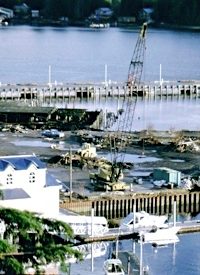
As states across the nation have begun to reclaim their rights through nullification and lawsuits, Alaska has embarked on its own dispute with the federal government to assert its rights as they pertain to endangered species. In fact, the Last Frontier has gone so far as to describe its protracted legal battles with the federal government in its annual law report.
Entitled the 2010 Annual Report of the Alaska Department of Law, the publication provides details about the state’s clashes with the federal government over animal protection. The New York Times explains:
Page 21 tells the fascinating tale of the Cook Inlet beluga whale — specifically of Alaska’s legal battle to remove it from the federal endangered species list. On Page 22, it recounts the state’s continuing fight to remove protections for the Eastern Steller sea lion. Page 24 provides an update on the battle against a federal decision that prevents Alaska from killing wolves to protect a declining caribou population.
As noted by Alaska Attorney General John Burns, the conclusion to the disputes over the state’s arctic wildlife is crucial, as federal environmental restrictions currently limit Alaska’s ability to drill for oil, mine precious metals, build roads, and develop the state and utilize its natural resources overall.
In a letter addressed to Alaska Governor Sean Parnell and state lawmakers, Burns asserted:
The Department of Law, in conjunction with other state agencies and with the assistance of the administration and the Legislature, must and will remain vigilant in protecting against the federal regulatory overreach that threatens our socioeconomic well-being.
The New York Times points out that Alaska’s stance is reflective of the current climate wherein states are attempting to re-establish their authority that has long since been usurped by the federal government, as it twits the state for the amount of federal largesse it receives:
Amid the recent rush of resistance to federal initiatives nationwide — with terms like “state sovereignty,” “constitutional conservative” and “nullification” becoming increasingly common in the political patois — Alaska stands out for the considerable experience and irony it brings to the debate. No matter which party is in power in Alaska, the state has long cried for more autonomy, and its governors have boasted of filing suit, even as it has routinely received more federal money per capita than any other state.
Alaska has been involved in a number of legal battles with the federal government in addition to the dispute over wildlife protection — including overturning the healthcare law.
Juneau’s Democratic mayor Bruce Botelho contends, “There’s a lot more litigation,” adding, “It reflects deep conviction on the part of the Parnell administration that the federal government has overstepped its bounds.”
Governor Parnell — who declared last month that the federal government was “openly hostile” to Alaska’s oil production — outlined in a recent speech at a Fairbanks Rotary Club a series of steps his office would be taking to “fight federal overreach,” particularly as it relates to oil production.
Proof of Parnell’s willingness to go head to head with the federal government can be found in his appointment of Dan Sullivan as commissioner of the state agency that promotes oil production. Sullivan has garnered a reputation for leading fights against the federal government.
Parnell has also been inspired by discussions he’s had with officials in other oil-producing states such as Texas. “I think we’re seeing a new alliance of states that are crying foul,” he observed.
The state of Alaska has a history of clashes with the federal government regarding oil production. Last year, for example, the state filed a lawsuit against the government to block a federal moratorium on offshore drilling in Alaska — a moratorium that was suggested by Secretary of the Interior Ken Salazar but never actually implemented. The lawsuit was dismissed as a result.
Federal protections for Alaska’s wildlife have proven to be an obstacle for the state’s oil production. Alaska has attempted to rectify administratively some issues related to wildlife, and has addressed other issues via lawsuits.
The Parnell administration grew so weary of the continuous battle with the federal government that it established a position for a lawyer who deals solely with issues involving the Endangered Species Act.
Governor Parnell, poised for a fight, has declared:
Rather than managing public resources for public benefit, a number of federal agencies act more like the night watchman of a locked warehouse. Well, we have a message for Washington. We want our state back.
Photo: Ketchikan harbor




